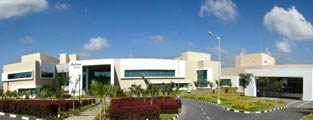Saudi Arabian petrochemicals firm Sabic has officially opened its R&D centres in Bangalore, India, and in Shanghai, China, both of which have been built with an initial investment of US$100 million each. The centres add on to the 17 Sabic global technical centres, including two existing dedicated centres in the Asian region - one in Moka, Japan, and the other in Sungnam, South Korea.

The Bengaluru facility has an area of 187,000 sq m, housing over 300 scientists from India. At the opening ceremony, Sabic CEO Mohamed H. Al-Mady said that scientists will undertake research into new platforms for next-generation materials across industry sectors including construction, clean energy, electrical and electronics, medical devices, transportation. "Other initiatives include designing greener building materials to reduce environmental footprints and developing eco-friendly products in response to global megatrends and needs."
Going forward, the firm says the Indian facility will have the largest number of scientists and researchers worldwide, with plans to double the headcount to 600 over the next 12-18 months. "We are gathering some of the best and brightest talent in India to shape the future of our R&D efforts and reaffirm our commitment to be the preferred technology partner for our Asian customers," Sabic Vice-President Ernesto Occhiello said.
Meanwhile, the 60,000 sq m Shanghai complex houses close to 500 employees including 170 application development and materials technologists. In addition, it also serves as the new Greater China head office for all Shanghai-based employees, including R&D and supporting functions.

The Chinese facility will focus on development work for portable consumer electronics, working closely with OEMs across the globe. It will also focus on developing next-generation innovative technologies and solutions to for customers in China and the North East Asia region.
Furthermore, the Riyadh-headquartered firm will sign a new agreement with its partner of almost two years, Dalian Institute of Chemical Physics (DICP), to research and develop advanced processing technologies to produce chemicals from alternative feedstock at the Shanghai facility.
The project is part of the US$50 billion diversified petrochemicals giant’s broader strategy of developing next-generation technologies to drive the future of its business. In line with this, Sabic says it will be an active participant to the DICP community, deploying scientists or assignment and contributing with funding for academic activities. Furthermore, it will bolster its sponsored research primarily regarding the conversion of fossil feedstock to chemicals.
(PRA)
















